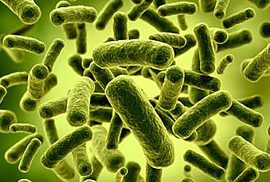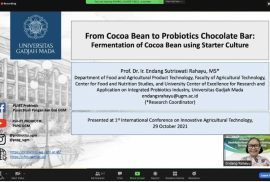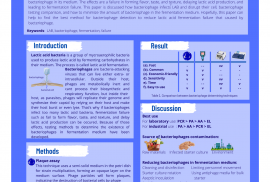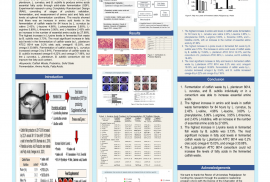Akhir-akhir ini, gut microbiota seringkali dikaitkan dengan metabolic disorder yang berdampak pada beberapa penyakit, seperti obesitas dan kardiovaskular. Untuk membuktikan bahwa memang terdapat perubahan gut microbiota pada kelompok tersebut, maka dilakukan analisis gut microbiota. Hasil analisis menunjukkan bahwa terdapat beberapa populasi bakteria yang mengalami penurunan drastis. Sedangkan, beberapa kelompok lain mengalami kenaikan yang signifikan. Penurunan jumlah bakteri pada gut microbiota diperkirakan berhubungan dengan terjadinya dysbiosis dengan penyakit tertentu. Diduga bahwa gut microbiota memiliki peran yang sangat besar sebagai penyebab metabolic disorder yang berlanjut pada terganggunganya kesehatan tubuh. Upaya yang dapat dilakukan untuk mengembalikan populasi bakteri yang terdesak akibat dysbiosis yaitu dengan membuat kondisi gut microbiota kembali ke normobiosis.
Pada hari Sabtu, 11 Desember 2021 PSPG UGM dan PUI-PT Probiotik berpartisipasi dalam Webinar Dokter Keluarga dengan tema Tatalaksana Diabetes dan Manfaat Probiotik. Prof. Endang S. Rahayu sebagai narasumber pada webinar ini menyampaikan materi berjudul Probiotik, Gut Microbiota, dan Diabetes.
Berikut penjelasan publikasi yang baru terbit mengenai mekanisme probiotik dapat membantu menjaga kesehatan penyandang diabetes.
Dari penelitian kami (Therdtatha, dkk., 2021) telah terbukti bahwa pada penyandang diabetes terjadi disbiosis, populasi Bacteroides fragilis meningkat yang selanjutnya ikut metabolisme bile acid terkonjugasi yang ada di usus, yang dapat mengganggu homeostasis glukosa.
Pada tanggal 29 Oktober 2021, PSPG UGM dan PUI-PT turut berpartisipasi dalam acara 1st ICIAT (International Conference on Innovative Agricultural Technology) yang diselenggarakan oleh Fakultas Teknologi Pertanian Universitas Udayana bekerjasama dengan Indonesian Society of Agricultural Engineering (ISAE) Bali chapter. Pada kesempatan ini Kepala PSPG dan PUI-PT Probiotik UGM, Prof. Endang S. Rahayu menampilkan judul “From Cocoa Bean to Probiotic Chocolate Bar“, berdasarkan penelitian panjang. Mulai dari survey mikotoksin pada biji kakao kering, skrining BAL yang memiliki antifungi, aplikasi BAL antifungi sebagai starter untuk fermentasi biji kakao di Lab dan di lapangan; yang ternyata memang dapat menekan pertumbuhan kontaminan jamur penghasil mikotoksin. Dilanjutkan dengan produksi chocolate probiotik (ChoBio) dari biji kakao berkualitas. Penelitian ini didanai oleh RISPRO LPDP, tahun 2019-2021.
Snack bar Probiobites merupakan suatu produk yang unik dari kebanyakan produk snack bar lainnya karena selain mempunyai tampilan yang menarik dengan bahan yang digunakan berasal dari bungkil cokelat, emping jagung, kacang tanah, dan tepung pisang. Bahan tersebut merupakan bahan-bahan lokal dan didapatkan dari petani lokal Gunungkidul sehingga selain enak juga dapat mengunggulkan potensi bahan pangan lokal. Snack bar Probiobites tidak menggunakan gula tebu, yang mampu memicu penyakit diabetes, melainkan menggunakan isomalt (sukrosa pengganti gula yang rendah kalori). Produk snack bar ini mengandung bakteri baik, berupa Lactobacillus plantarum dad-13, yang ditambahkan pada snack bar sehingga tambahan menjadi nilai tambah lainnya dan merupakan pembeda dari produk snack bar yang sudah diproduksi secara massal dan dikomersialkan.
PSPG UGM dan PUI-PT Probiotik tidak henti-hentinya melakukan pengembangan dan inovasi produk pangan. Bersama dengan Mahasiswa Fakultas Teknologi Pangan dan Pertanian UGM, saat ini tengah dikembangkan cream cheese dengan nama produk Keisra. Kesira merupakan cream cheese asli Nusantara berbahan dasar lokal.
Adapun dalam proses pembuatannya, Kesira menggunakan susu berkualitas yang berasal dari pemerah susu lokal Yogyakarta. Produk ini menjadi dairy product pertama di Indonesia yang menggunakan kultur starter bakteri asam laktat lokal yaitu Lactobacillus plantarum Dad-13 dan Streptococcus thermophilus Dad-11. Kesira mengandung jumlah bakteri baik sesuai dengan syarat produk pangan probiotik menurut Rahayu dan Utami (2019), yaitu sebesar 10^8 CFU/ml atau bahkan lebih. Penggunaan kultur starter lokal ini menjadikan Kesira memiliki rasa yang unik dibanding produk-produk serupa lainnya. Adapun tekstur dari produk ini adalah spread dan viscous sehingga dapat leleh saat di mulut. Selain itu, Kesira juga cocok dikonsumsi sebagai pelengkap kudapan, isian, olesan roti, topping salad, dan MP-ASI.
By: Fajar Hidayat1, Elian Hansel, Aulia Pasha Adiyani, Dina Aulia Fiana, Endang Sutriswati Rahayu
ABSTRACT
Increase cheese consumption in Indonesia not yet supported by availability of raw materials, especially culture starter. Lactobacillus plantarum Dad-13 isolated from Dadih have potency as a starter culture for making probiotic cheese. In this research, probiotic cream cheese was analyzed chemical and sensory characteristic compared cream cheese using commercial starter Flora Danica. Microbial characteristics and viability of Lactobacillus plantarum Dad-13 in it were also analyzed. In addition, the shelf life was determined under the typical refrigerator/cold storage conditions (± 2.5ₒC). Result shows (T<0.05) yield, moisture on fat-free basis, total solids, fat content of cream cheese respectively with commercial starter 43.50%, 90.42±0.60%, 51.99±0.32%, 90.20±2.85%, and with Lactobacillus plantarum Dad-13 38.15%, 84.59±1.17%, 55.73±0.61%, 85.53±1.63%. Result of sensory analysis show cream cheese using commercial starter and Lactobacillus plantarum Dad-13 have little white color (T<0.05), acid flavor (T<0.05), little soft (T>0.05), and little easy to spread (T>0.05), and hedonic analysis in overall not significantly different. The amount of viable Lactobacillus plantarum Dad-13 were able to be maintained at the functional level of 107-108 CFU/gr after keeping for 6 weeks at 2.5ₒC. The storaging treatment had a significant effect on changes in the viability of Lactobacillus plantarum Dad-13, but the significant effect was only seen at one week of storage or less. The cream cheese samples contained coliform that exeeded the acceptable safe limit (≤105 CFU/gr) on the first day of storage, although decreased to reach the acceptable safe limit during further storage time. The shelf life is determined to be 74 days.
By: Asmawati, Marianah, Desy Ambar Sari, Nurhayati
Abstract
Yogurt is a drink made from fermented milk with lactic acid bacteria, tastes slightly sour. In its processing, it can be fortified with purple sweet potato. This study aims to determine the effect of purple sweet potato fortification on the soyghurt quality. This study was arranged using a completely randomized design with fortification treatment of (0, 15, 30, 45, and 60 )% in the processing of soyghurt. The results were analyzed with 5% ANOVA and further test with 5% HSD. The results showed that fortification of purple sweet potato had a significant effect on chemical properties (protein content, lactic acid content) and organoleptic properties (color, texture, and taste scores) but had no significant effect on the flavor and antioxidant activity. The best treatment was obtained at 45% fortification treatment with protein content (3.16%), lactic acid content (2.46%), and antioxidant activity (82.68%). The flavor and taste are a bit like, the color is light purple color, and the texture is a slightly thick.
By: Agussalim Matti, Tyas Utami, Chusnul Hidayat, Endang Sutriswati Rahayu
Abstract
Chao, a traditional fermented fish from South Sulawesi. The purpose of this study was to explore the proteolytic Lactic Acid Bacteria (LAB) from the chao traditional fermentation of tembang fish. This study consisted of two stages, namely isolation and identification proteolytic LAB from chao traditional fermentation and apply it as a starter in the chao fermentation. LAB isolation was done using the scratch method. Proteolytic LAB selection was carried out using the skim agar medium. Identification of proteolytic LAB was carried out with API 50 CHL kit and analysis of 16S rRNA gene sequences. The application of proteolytic LAB was carried out in 3 stages of fermentation, namely salt fermentation, LAB fermentation, and chao fermentation. The results showed that 15 proteolytic LABs were obtained from chao traditional fermentation. Two proteolytic LABs identified as Lactobacillus plantarum Ags 1-3 and Pediococcus acidilactici Ags 7-3. The results of the application of proteolytic LAB showed that in salt fermentation, there was no growth of microorganisms, no changes in lactic acid and pH, but there is an increase in dissolved proteins and activity of ACE inhibitors. In the LAB fermentation, there is an increase in total bacteria, LAB, yeast, dissolved proteins and the activity of ACE inhibitors, but the mold not grow, not change in the value of pH and lactic acid. In the chao fermentation, there is an increase in the number of bacteria, LAB, yeast, dissolved proteins, activity of ACE inhibitors, and lactic acid. The fungi and pH value were decreased.
By: Afifah Khairunnisa Baasir
ABSTRACT
Lactic acid bacteria (LAB) is a group of microaerophilic bacteria that can metabolize carbohydrates with fermentation to form lactic acid as its end product. Lactic acid bacteria are generally recognized as safe (GRAS) and have been used for centuries in food processing (either plant-based or animal-based). Lactic acid fermentation can be bothered by the existence of bacteriophage in its medium. The effects are a failure in forming flavor, taste, and texture, delaying lactic acid production, and leading to fermentation failure. This paper is discussed how bacteriophage infects LAB and disrupt their cell and how to minimize the amount of bacteriophage in the fermentation medium. Hopefully, this paper can help to reduce lactic acid fermentation failure, especially that caused by bacteriophage.
By: Ratu Safitri, Eri Sulistiati, Abun, Tri Yuliana
ABSTRACT
Catfish waste (Pangasius sp.) has a high nutritional content of 22.96% carbohydrates, 35.81% protein, and 12.47 % fat, so it is very potential as raw material for the production of amino acids and essential fatty acids through fermentation. In the study of catfish waste fermentation using L. plantarum, L. curvatus, and B. subtilis, the aim was to analyze L. plantarum, L. curvatus, and B. subtilis to produce amino acids essential fatty acids through solid-state fermentation (SSF). Experimental research using Completely Randomized Design (RAK), consisting of stages of probiotic validation, fermentation, and measurement of amino acid and fatty acid levels at optimal fermentation conditions. The results showed that there was an increase in amino acid levels in the fermentation of catfish waste for 84 hours by L. curvatus by valine 2.43%; L-leucine 4.96%; L-phenylalanine 3.60%; L-arginine 5.89%; L-threonine 3.95%; and L-histidine 2.43% with an increase in the number of essential amino acids by 27.68%. The highest increase in L-lysine levels in fermented fish waste by B. subtilis was 3.73%. The most significant increase in fatty acid levels in the fermentation of catfish waste by L. plantarum ATCC 8014 was 0.2% oleic acid, omega-6 15.03%, and omega-3 30.88%. Fermentation of catfish waste by L. curvatus increased omega-3 by 5.94%. Fermentation of catfish waste by B. subtilis increased omega-6 4.22% and omega-3 7.98%, but the L curvatus, L. plantarum, B. subtilis consortium did not improve the fatty acid content.










